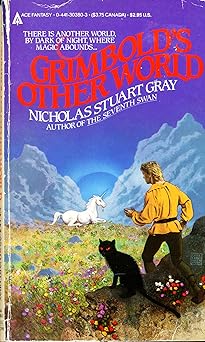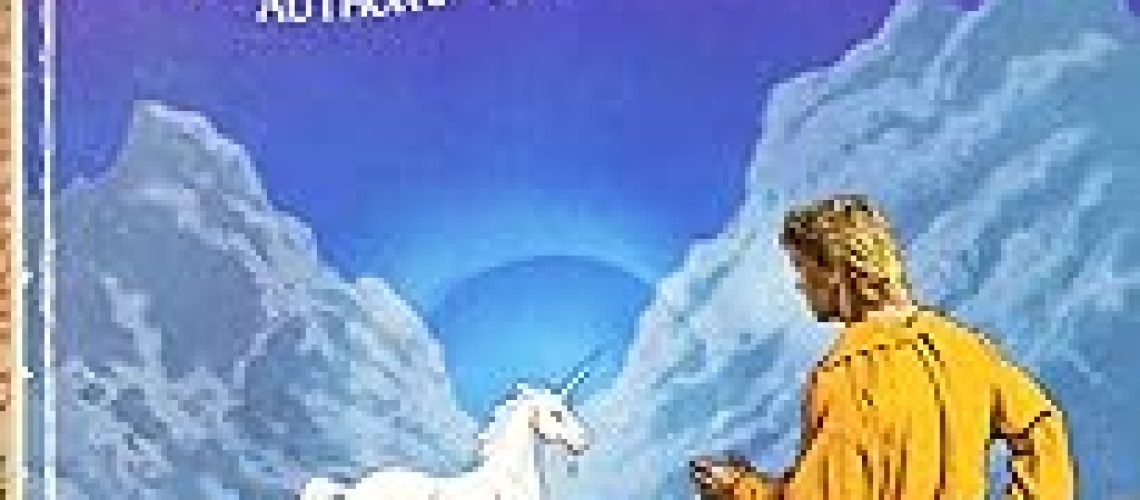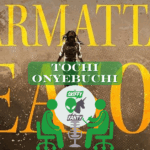I picked up my copy of Grimbold’s Other World in the Book Swap, a used books store in State College, Pennsylvania. It always had a big selection of SFFH books. I just checked, and I’m very happy to see that the shop still exists, though now it’s called Comic Swap and also sells games, etc.—but also still sells books.
The title was immediately arresting, and when I pulled it off the shelf, the cover revealed a youngster looking at a unicorn lying in a meadow between mountains, with a red-eyed black cat beside him. I’d never heard of the author, Nicholas Stuart Gray, but the back-cover copy was enticing, and I wasn’t too proud to try reading an old (1963) children’s book as a nice change from atmospheric science homework.
(Wikipedia says Gray’s best-known other work was the novel The Seventh Swan (1962). It adds that Gray wrote plays and short stories along with novels, and was born Phyllis, began presenting as male in 1939, and underwent medical transition in 1959. So, I’m happy to be including more trans representation on the blog via this review!)

The protagonist of Grimbold’s Other World is a boy named Muffler, so called because he was found as an abandoned baby, wrapped in a white silk scarf. Raised by a farming couple, he’s a dreamer, poet and storyteller who acts as the village goatherd. He is kind and likes to be useful. Sick at home one night, he’s visited by a talking cat who asks for his help, tells him how to ask the fire to cure his cold, and takes him across into the night-world to free another boy who’s trapped in a bad situation.
The words fae and fairy aren’t used in Grimbold’s Other World, but it’s much more akin to that kind of book, or a gentle children’s version of a Charles de Lint story, where magic is just around the corner or across an invisible border for those with eyes to see and ears to hear, than a Narnia-style portal fantasy where a child crosses and stays for months, years, forever, or until a quest is completed before it’s possible to return home. That can happen to an unlucky few, but Muffler visits the night world several times for short explorations and quests that are over before anyone at home notices. But things eventually get more complicated.
The book’s chapters seem at first to be an unconnected set of adventures, including such random events as helping a Weirdie look for a lost bird in a set of mountain tunnels. But it turns out there are several throughlines: A sorcerer’s continuing quarrels with his son, a prince’s quest for a unicorn, and a lost heir. All these threads end up weaving together in a very satisfying way. At times Muffler is an unwitting pawn, but he also needs to make some crucial choices, take some big risks, and persuade others to go along with him.
Whenever someone needs help, Muffler agrees, but in some cases he’s choosing only for himself:
“Beware of the gifts of magic! You may outgrow your dreams, and live happy as a farmer, like the rest of the village you know. If you take magic—you must pay for it. You will for ever be set apart. It’s a great price. Which will you choose? A calm and normal life—or magic? Whichever you choose, you may be wrong!”
Silence fell in the cavern. Muffler looked into the unblinking eyes of the Weirdie.
“I choose magic,” he said. “It would cost me more to outgrow my dreams.”
Since Muffler is a poet, and learns to use rhymes to make magic, poems and songs appear throughout the book; in addition, each chapter ends with a poem that reflects what just happened. Some of the rhymes are very simple and silly, but some of the poems and moments of prose are achingly beautiful. But the prose isn’t flowery for the sake of poesy; it’s usually quite direct and clear. (Watch out for hidden meanings and foreshadowings, though!)
I like Muffler very much, and most of the characters, including goats, farmhorses, village children, a musician, a Queen, and others, are endearing. The sorcerer and his son are both jerks, but there’s a hint of hope for both of them, too. And I love how everything is resolved at the end.
Despite my not coming across this book until my adulthood, Grimbold’s Other World has become one of my favorite children’s books, and well worth rereading every few years. Unfortunately, a quick search doesn’t show any of his work available in ebook form, but if you see anything of his in paper or hardback at a reasonable price, my advice is to give it a try.







